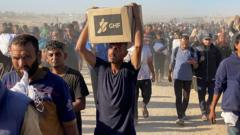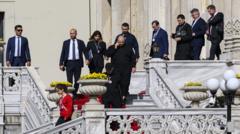Hamas' current position reflects the dual pressures of humanitarian crises in Gaza and escalating military actions by Israel, complicating negotiation efforts and regional stability.
Hamas offers hostage deal while pushing for US ceasefire plan revisions

Hamas offers hostage deal while pushing for US ceasefire plan revisions
Hamas proposes releasing Israeli hostages in exchange for Palestinian prisoners, while demanding key changes to US ceasefire terms.
Hamas has expressed a willingness to release 10 living Israeli hostages and 18 deceased in exchange for a number of Palestinian prisoners, while insisting on several amendments to a US ceasefire proposal. The group emphasized its demands for a permanent ceasefire, complete Israeli withdrawal from Gaza, and uninterrupted humanitarian aid flow—none of which are included in the current US offer. This response neither explicitly rejects nor fully accepts the terms set forth by Washington, which states that Israel is on board.
Steve Witkoff, the US special envoy for the Middle East, stated he had received Hamas's response and deemed it "totally unacceptable," indicating the proposal takes negotiations backward. He urged the group to accept the framework to begin proximity talks immediately, making it clear that a 60-day ceasefire deal is in the offing if terms are accepted.
The Israeli side, represented by Prime Minister Benjamin Netanyahu, confirmed willingness to accept the updated proposal but noted that Hamas continues its refusal. The situation for Hamas has become increasingly complex amid dire humanitarian conditions for nearly 2.2 million Palestinians in Gaza.
Hamas has previously rejected various proposals, including one during March negotiations, stating it would not settle for deals that do not lead to a complete and lasting cessation of hostilities. However, the group is also wary of outright rejecting the current US offer, especially with Israel poised for potential military escalations.
The specifics of this US plan remain largely undisclosed but reportedly outline a ceasefire alongside provisions for hostage exchanges and humanitarian relief channels. These terms were crafted with Israeli approval beforehand, raising doubts on whether Netanyahu’s government will entertain Hamas's requests for modifications.
The Israeli government has consistently stated the conditions under which a truce would be sustainable, with former defense minister Israel Katz asserting that Hamas must choose acceptance or face dire consequences.
As of Saturday, the health ministry in Gaza reported the death of 60 individuals and injuries to 284 others amid resumed Israeli strikes, a stark reminder of the ongoing violence since the conflict reignited following a Hamas assault on October 7, 2023. Since that time, the Hamas-controlled ministry claims at least 54,381 fatalities in Gaza, including 4,117 since a fresh Israeli offensive began on March 18.
This scenario highlights the chaos and volatility in legal mediation efforts for Gaza while people continue to suffer from the immediate impacts of war and humanitarian shortages.






















